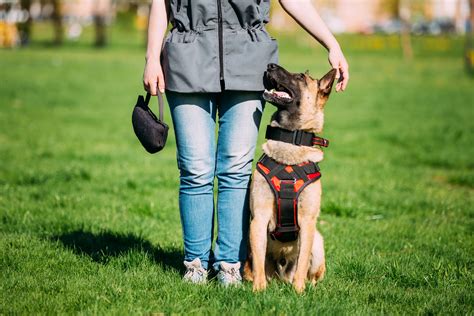Find the best dog trainer by assessing methods, experience, certifications, reviews, and compatibility. Consider cost and value for money. Make the right choice.
Assessing training methods
Finding the Best Dog Trainer: What to Look For
When searching for the best dog trainer, it’s important to assess the training methods they use. Look for trainers who utilize positive reinforcement techniques, such as rewards and praise, to encourage desired behaviors in your dog. Avoid trainers who rely heavily on punishment or dominance-based methods, as these can lead to fear and anxiety in your pet.
Consider attending a training session or consultation with the trainer to observe their methods firsthand. Watch how they interact with the dogs in their care and pay attention to the overall atmosphere of the training environment. A reputable trainer will focus on building a positive bond between you and your dog, rather than using force or intimidation to achieve results.
Additionally, ask the trainer about their specific approach to addressing common behavioral issues, such as leash pulling, jumping, and aggression. A skilled trainer will have a well-rounded understanding of dog behavior and will be able to tailor their methods to meet the needs of your individual pet. By thoroughly assessing the training methods of potential trainers, you can ensure that your furry friend receives the positive and effective training they deserve.
Evaluating experience and expertise
Finding the Best Dog Trainer: What to Look For
When searching for a dog trainer, it’s important to consider their experience and expertise in the field. Look for a trainer who has a solid understanding of dog behavior and training methods, as well as a proven track record of working with a variety of breeds and behavior issues. An experienced trainer will have the knowledge and skills to assess your dog’s individual needs and create a tailored training plan to address any behavioral challenges.
Additionally, consider the expertise of the trainer in specific areas of training, such as obedience, agility, or behavioral modification. Depending on your dog’s needs, you may want to find a trainer who specializes in a certain area to ensure they have the right skills and experience to address your dog’s training requirements.
It’s also important to ask about the trainer’s professional background and qualifications. Look for credentials such as certifications from reputable dog training organizations, as well as any additional training or education they may have completed. A trainer with a strong foundation in dog training principles and methodologies will be better equipped to help you and your dog achieve training success.
Checking for certifications and qualifications
When looking for the best dog trainer, it is essential to check for certifications and qualifications to ensure that the trainer has the necessary knowledge and skills to provide effective training. A certified dog trainer has undergone professional training and has met specific standards, demonstrating their commitment to continuing education and ethical practices. This can provide assurance that the trainer is knowledgeable in dog behavior, learning theory, and training techniques.
In addition to certifications, it is important to evaluate the qualifications of the dog trainer. This includes their educational background, experience working with different breeds and behavior issues, as well as any specialized training they may have received. A qualified dog trainer should have a deep understanding of canine behavior and be able to tailor training methods to suit the individual needs of each dog.
By checking for certifications and qualifications, dog owners can have confidence in the expertise and professionalism of the trainer they choose, knowing that their pets are in capable hands. It is also a way to ensure that the trainer is committed to providing high-quality, ethical training that prioritizes the well-being of the dogs under their care.
Researching reviews and testimonials
When looking for the best dog trainer, it’s important to take the time to thoroughly research and read reviews and testimonials from other pet owners. Reviews and testimonials provide valuable insight into the experiences of other dog owners who have worked with the trainer. Look for reviews that speak to the specific training methods used, the trainer’s communication style, and the overall satisfaction of the clients. By gathering this information, you can gain a better understanding of what to expect from the trainer.
In addition to reading reviews, it can be helpful to seek out testimonials from previous clients. Testimonials offer a firsthand account of the trainer’s abilities and the impact of their training methods on the dog’s behavior. Look for testimonials that speak to the trainer’s expertise, professionalism, and the results achieved. This firsthand feedback can provide valuable insight into the trainer’s strengths and weaknesses, helping you make an informed decision.
By thoroughly researching reviews and testimonials, you can gain a comprehensive understanding of the trainer’s track record and reputation within the community. This information can help you make an informed decision when selecting the best dog trainer for your furry friend.
Considering training philosophy and approach
Finding the Best Dog Trainer: What to Look For
When searching for the best dog trainer, one of the key factors to consider is their training philosophy and approach. Different trainers have different methods and beliefs when it comes to training dogs, and it’s important to find one whose approach aligns with your own values and goals for your pet.
Some trainers may use predominantly positive reinforcement techniques, while others may incorporate more aversive methods. It’s essential to do thorough research and consider what type of training philosophy resonates with you and your dog. Ensure that the trainer’s approach is not only effective but also ethical and aligned with your own principles.
Additionally, consider the specific training methods that the trainer utilizes. Whether they focus on obedience training, behavior modification, or specialized training for specific activities such as agility or scent work, understanding their approach will help you determine if they are the right fit for your dog’s needs.
Assessing trainer-dog compatibility
When looking for the best dog trainer, it is important to consider the compatibility between the trainer and your dog. This involves assessing whether the trainer has experience working with dogs of similar breed, size, and temperament as your own. It is also crucial to evaluate the trainer’s ability to understand and connect with your dog on a personal level, as this will greatly impact the effectiveness of the training sessions.
Furthermore, compatibility also extends to the training methods used by the trainer. Some trainers may have a more assertive and dominant approach, while others may focus on positive reinforcement and reward-based techniques. It’s important to find a trainer whose training philosophy aligns with your own beliefs and goals for your dog’s behavior.
Lastly, observing how your dog responds to the trainer is key in assessing compatibility. A good trainer will be able to gain your dog’s trust and cooperation, leading to a positive and productive training experience. This can be determined through initial consultations or trial sessions to see how well the trainer and your dog interact with each other.
Evaluating cost and value for money
When looking for the best dog trainer, it’s important to consider the cost and value for money that you will be getting. Dog training can be an investment, so you’ll want to make sure that you are getting the most out of the money you’re spending. Consider the price of the training program and what it includes. Some trainers may offer package deals or discounts for multiple sessions, so be sure to inquire about any potential cost savings.
It’s also important to evaluate the value for money that the trainer is providing. Look for a trainer who offers personalized attention and a tailored training program for your specific dog. Make sure that the trainer is using positive reinforcement methods and that you are getting tangible results for the money you are spending. A reputable trainer should be able to demonstrate the value of their training methods and provide evidence of successful outcomes with previous clients.
Ultimately, when evaluating cost and value for money in a dog trainer, it’s important to consider the long-term benefits. While it may seem like a large upfront cost, investing in quality training can ultimately save you money in the future by preventing behavior issues and creating a well-behaved, happy dog.
Frequently Asked Questions
What qualities should I look for in a dog trainer?
Look for a trainer who is patient, experienced, and uses positive reinforcement methods.
How can I assess a dog trainer’s experience?
Ask about their training and certification, and request references or testimonials from previous clients.
Are there specific certifications or qualifications I should look for in a dog trainer?
Look for trainers who are certified by reputable organizations such as the Certification Council for Professional Dog Trainers (CCPDT) or the International Association of Canine Professionals (IACP).
What are red flags to watch out for when choosing a dog trainer?
Avoid trainers who use harsh punishment, have limited experience, or make unrealistic promises about behavior modification.
Should I observe a training session before hiring a dog trainer?
Yes, observing a session can give you insight into the trainer’s methods, handling of the dogs, and overall approach to training.
What questions should I ask a potential dog trainer?
Ask about their training philosophy, experience with your dog’s specific breed or behavior issues, and how they handle setbacks or challenges during training.
Is it worth investing in professional dog training?
Yes, professional training can improve your dog’s behavior, strengthen your bond, and make daily life with your dog more enjoyable and rewarding.





